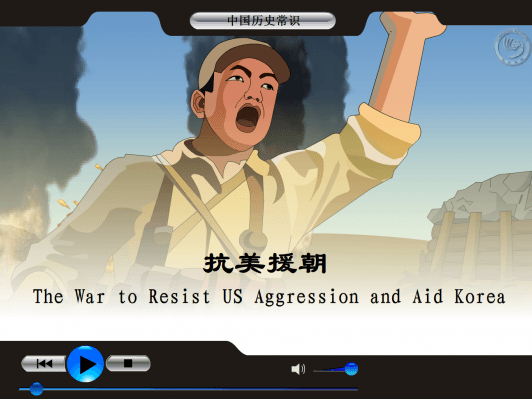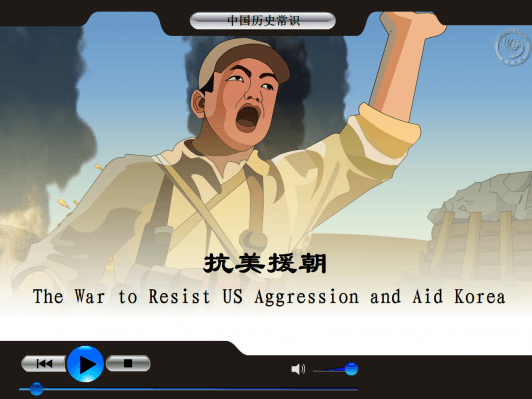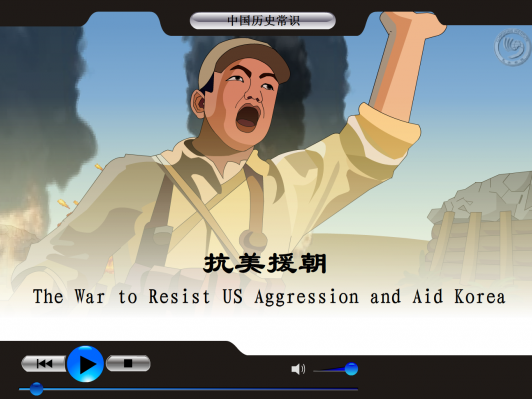“Whoops, better delete that one,” must have been what they were thinking at Confucius Institute Online when purging the page about “The War to Resist US Aggression and Aid Korea.”
That portrayal of the Korean War, part of a series of Chinese history lessons that hew closely to the Chinese Communist Party’s official narrative, explained that China “crushed the imperialists’ aggressive ambitions and ”enhanced China’s international prestige” in the Korean War.
It was on the “Kids” section of the website.
‘U.S. Aggression’
The video says that “The United States manipulated the UN Security Council to pass a resolution to organize a UN Command consisting mainly of U.S. troops to enlarge the aggression against Korea.”
It then says that the United States “tried to seize the whole peninsula.”
“They also bombed Chinese villages near the Chinese-Korean border.”
Only then did China enter the conflict, as “volunteers,” the video indicates. A determined Chairman Mao is shown looking through binoculars. “The Chinese government made the decision to resist the United States, aid Korea and protect our mother land,” the video says.
China’s volunteers beat the UN forces beyond the 38th Parallel, successfully turned the war around, and “won a peaceful environment of relative stability for the construction of New China,” it says.
Frank Cohee, the Secretary of the Korean War Veterans Association, found the narrative problematic. “It’s bull,” he said. “That’s strictly propaganda.”
Cohee is a Korean War veteran and served there in 1950 and 1951. “I was there when the Chinese came in,” he said.
Ted Barker, a founder of the Korean War Project, wrote in an email that “The contents are blatantly propagandistic and do not follow established facts as recorded by thousands of participants in that horrible war.”
The page is available only in cache now. It was deleted on June 11, the morning after Christopher Hughes, a professor at the London School of Economics, sent the link in an email to colleagues that were discussing the Confucius Institute’s teaching materials.
Confucius Institutes (CI) identify themselves as Chinese language learning centers established at educational institutions around the world.
They are supervised by an organization called Hanban, which is headed by Liu Yandong, a member of the Chinese Communist Party’s Politburo. Her former job was head of the United Front Work Department, a Soviet-era communist front organization. The companion of the CI is the Confucius Classroom, which usually cater to elementary and high-school students.
Scholars of China say that CIs and Confucius Classrooms are part of the Chinese Communist Party’s (CCP) overseas propaganda efforts, which have stepped up in recent years, aiming to foster positive public opinion about China abroad. In pressing that mission, historical factuality takes a back seat.
Historical Distortions
The deleted video about the Korean War is part of a series describing Chinese history in terms that closely resemble official propaganda regularly taught in schools throughout China, according to experts.
Terence Russell, associate professor at the Asian Studies Centre at the University of Manitoba, characterized the material as “pretty scary.” He thought it was not appropriate for children, who lack the critical faculties to parse propaganda.
“This material clearly does not meet even the most basic criteria for ‘neutrality.’ It is very heavily endowed with the current PRC/CCP slant on the issues described,” he said. “The nationalistic chest-thumping is deafening throughout.”
Russell added: “It is like inviting the Taliban to come to Canada to teach Elementary school kids about the history of imperialist aggression in Afghanistan. You wonder how much kids are ready for any information about imperialist aggression in the first place, then add the anti-Western slant…”
“China as a World Power in Sports” discusses the PRC’s successful bid for the Olympics “which vigorously promoted the development of China’s sports, demonstrated the increase of China’s overall national strength and enhanced China’s international status.”
The section on “The Founding of New China” explains that “The founding of the PRC marked the end of a 100-year-old history of semi-colonial, semi-feudal society in the old China, and opened a new chapter in Chinese history.”
There is no mention of the political campaigns that killed an estimated 80 million people.
June Teufel Dreyer, a professor at the University of Miami, provided a detailed analysis of several of the videos, in particular those about the Korean War, the Sino-Japanese War of 1894-5, and the reference to Japanese pirates.
“They are outrageous distortions of what actually happened,” she wrote, before describing specific historical divergences in the material, and providing book and page references for further reading.
“In sum, these videos seek to create the image of a blameless, heroic China fighting valiantly for the good and the true. They just happen to distort history badly in the process,” she concluded.
In the Classroom
It is unclear how much of the material on the website is taught in classrooms in the United States or elsewhere.
Anecdotes on the Hanban website refer to “sharing [online] teaching resources” with volunteer CI teachers.
One story from the United Kingdom titled “Under the Olympic flag” refers to the use of online teaching resources, showing a CI teacher at a computer with students.
An article on the CI website introducing the Online College says that “Online Confucius Institute is a good teaching platform, and its wealthy teaching resources, and interesting teaching model is very helpful for students learning Chinese in their spare time. Therefore, teachers of Dublin College University [sic] have spared no effort to introduce students to the Online Confucius Institute in secondary schools and university classes.”
Li Xiaodong, a teacher at the Confucius Institute at the University College Dublin in Ireland did not respond to a telephone call and an email enquiring about how online material is integrated into classrooms.
According to Chris Livaccari, Director of Education and Chinese Language Initiatives at Asia Society, as far as he is aware his organization’s network of around 100 Confucius Classroom’s in America do not incorporate material from the Confucius Institute Online in any organized fashion.
The schools work with Hanban, but “the curriculum is determined by the individual teachers and schools,” he said in a telephone interview. He did not comment on the content of the teaching material.
Premodern Propaganda
The problematic history presented on the website does not relate only to modern Chinese history, according to Terence Russell. The presentation of premodern Chinese historical stories is also highly self-serving, he indicated in an email. The problems lie both with historical accuracy and “ideological spin.”
One video that he indicated as problematic was “Ancestors of the Chinese Nation.” The story is about how the Yellow Emperor and Emperor Yan defeated a barbarian people in the Yellow River valley, laying the foundation for the Chinese nation.
Russell had never heard of the story and suspected “CI people just made it up based upon other myths.” He writes: “It is a story about clearly identifiable ancestors overcoming barbarians to found a civilized culture in the Yellow River valley.
“It supports the basic CCP nationalist discourse about a single source for Chinese civilization in the Yellow River, and also presents the idea that non-Han peoples are enemies who can be defeated if the Hua-Xia work together. You can sort of take if from there as to what that means as a discourse for the modern world.”
A more troubling representation was given in the video about Zhu Yuanzhang, the controversial founder of the Ming Dynasty. “Zhu was actually a pretty complex person, but in the video he is given credit for laying the basis for strong dynastic governance by centralizing power in his own hands and commissioning a secret spy agency (!),” Russell writes.
He added: “The message is obviously that there are good reasons for autocracy and spy networks.”
The Epoch Times publishes in 35 countries and in 19 languages. Subscribe to our e-newsletter.







